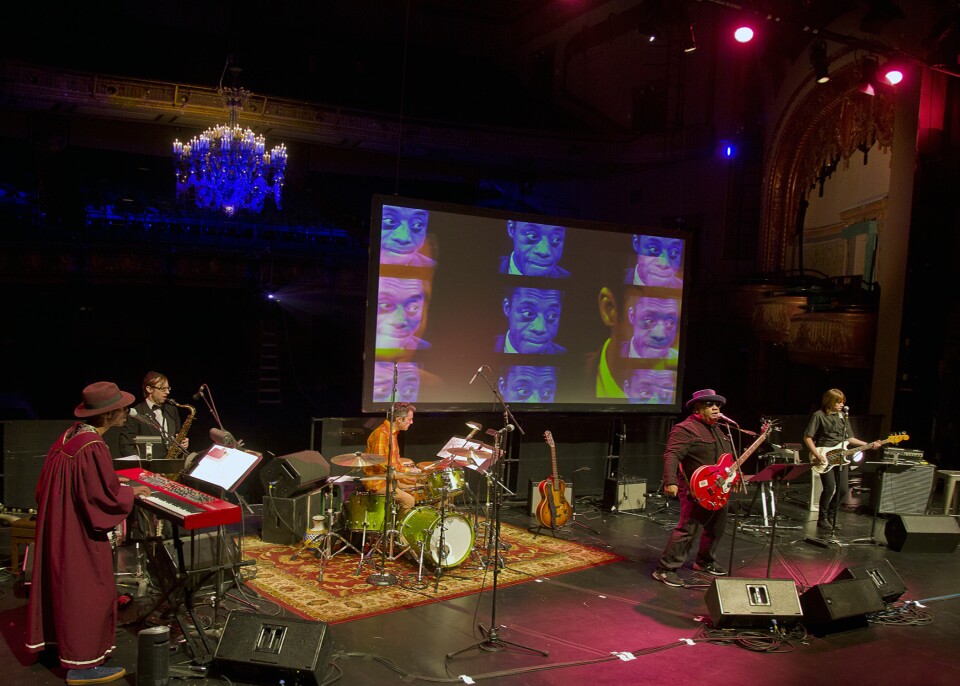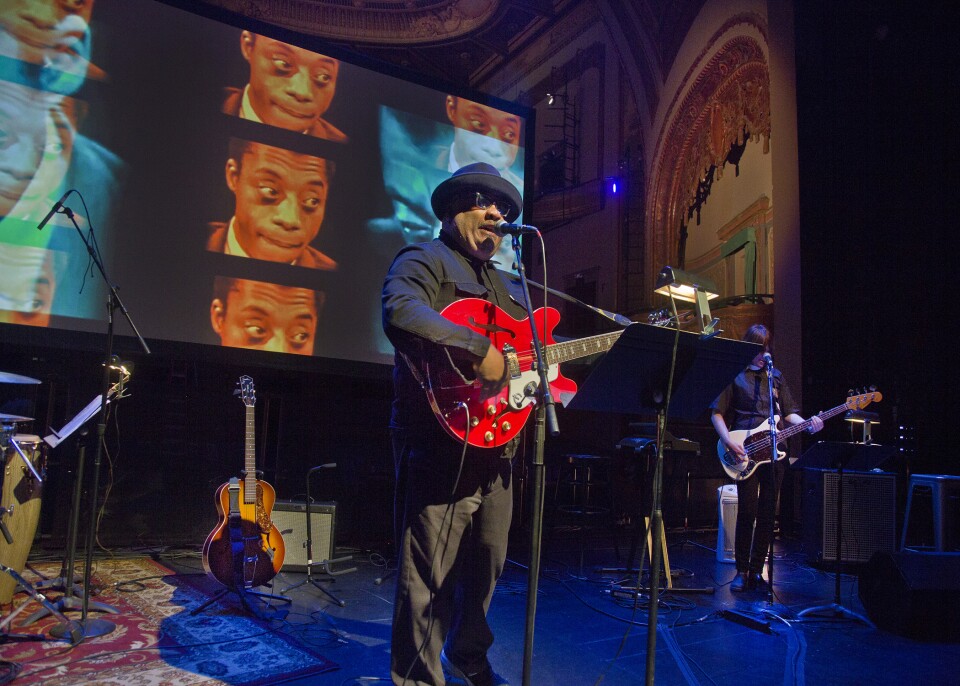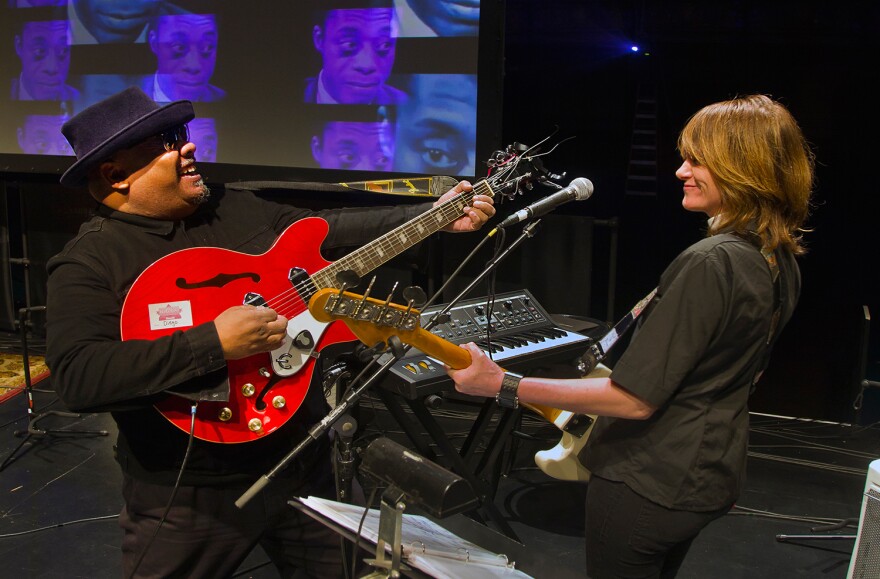The song cycle, "Notes of a Native Song," by the duo Stew & Heidi, plays like a love letter to James Baldwin; Prestige shows rule this year's SAG Award nominations. Alex Jung of Vulture.com joins Josie Huang to discuss the television categories; The Frame's John Horn visits with members of the L.A. theater troupe, Impro, as they rehearse their improvised holiday play that spoofs those 1960's variety shows;
SAG Award nominations: Who's in and who's out?
It’s red carpet time! And the Screen Actors Guild (SAG) is one of the first award shows of the season. The nominations (full list) are out and we wanted to take a closer look at the TV shows — what captured attention and what got overlooked. Also, what the SAG Awards can tell us about how the rest of trophy season will go. Guest host Josie Huang checks in with Alex Jung, a writer for Vulture.com on what the nominations mean.
Interview Highlight:
Who is voting to nominate the shows
It's going to be actors. That's why the SAG is the largest voting block for the Oscars. These actors literally hold a card and vote for their favorite performance. That's important because it's coming from your peers, and that's why it's held in such high regard.
Why so many critics' darlings got snubbed
People who love TV would have loved to see "The Americans" on the list. And there are smaller dramas that get snubbed. "Atlanta" was a big bummer for me. I would have loved to see it get nominated for best comedy. I would love to have seen Brian Tyree Henry and Keith Stanfield get nominated for that show. They are just brilliant. Comedy is the real missed opportunity in a lot of ways. "Fleabag" is amazing! "Insecure," too. It looks like the CW curse continues. I would love to see "Jane the Virgin" and "Crazy Ex-Girlfriend" get their names out there. It's definitely a crowded field.
Networks vs. Netflix
Right now cable and streaming have a little more appeal. People give them more creative freedom and more budget for those productions. "The Crown" on Netflix is one of the most expensive shows ever made. It would be nice to see network names out there. "Speechless" on ABC is really good. However, in terms of comedy, network has sitcoms down to a science. "Big Bang Theory" and "Modern Family" are still the biggest comedies on television.
- E. Alex Jung is a writer at Vulture.com. He tweets .
Click on the blue media player above to listen to the full interview.
'Notes of a Native Song' is a rock 'n' roll homage to James Baldwin
The stage production "Notes of a Native Son" plays like a love letter to James Baldwin.
Baldwin was born in Harlem and was a prolific poet and essayist. But he was also a unique figure who bridged the civil rights and gay rights movements, which gave him an exalted status in American culture.
“Notes of a Native Song” — a play on Baldwin’s “Notes of a Native Son” — isn’t so much a biography. It’s an expression of what his life meant to the singer and songwriter who goes by the single name of Stew. He won a 2008 Tony Award for his semi-autobiographical musical, “Passing Strange.”
When Stew and musical partner Heidi Rodewald joined The Frame’s John Horn in studio, they started by discussing how “Notes of a Native Song” came to be.
Interview Highlights:
On how the show got started:
STEW: I was wanting to make a show about Harlem. I approached Harlem Stage, which is a wonderful venue. And they said, Yeah, make a show about Harlem. And then they [said], You know, the James Baldwin centennial is coming up. Any chance you'd be interested in doing something around that? I was like, Y-E-S.
On how Baldwin inspired him:
He's the guy that put me on the path that I'm on. He taught me that it was okay to be a freak. He taught me that it was okay to not be confined by the limits of what people called "blackness." And he told me you could go to Europe and have a whole lot of fun.

On what Baldwin meant to Heidi:
RODEWALD: I was horribly excited to be part of this. The thing with me is, I'm a white girl from Orange County. And it's not like I've read every James Baldwin, but I do know [him]. It's like we're engaging with the spirit of James Baldwin every night. And there's something I take from all this. And what I was so excited about is it's so important to be an individual. This is so rock 'n' roll. This is like what Stew and I consider to be rock 'n' roll.
On approaching Baldwin as a subject:
STEW: We consciously wanted to approach him in the exact opposite way [from] Great Moments in Black History ... Hey, it's February! Let's all talk about how great James Baldwin is! — this kind of whitewashed way that we tend to approach our heroes. It was like the actual opposite. We looked at it like we were doing a show about Keith Richards. It was all about being really as irreverent as we could personalizing [Baldwin] and not giving people the Ken Burns concert version of him.

On what about Baldwin they wanted to highlight:
I think everything about his life was musical. I wanted to pay tribute to the fact that he was really into music and a very eclectic personality. When I was in the Schoenberg Library reading his letters, I found some coasters from a bar that he used to frequent. On these two coasters he had written this really drunken, sprawling thing about the drummer who was onstage. Now, this will probably never get into a book, and it was just so moving that here he is, James Baldwin, and he's drunk out of his mind and he's writing about the drummer. I just thought, This is the guy we want to make a show about. We can do anything we want with him because, that's the thing, the great ones like him and like Shakespeare — you can do anything with them.
On where the visualizations in "Notes" came from:
You have to understand that the first audience we did this for was a Harlem audience. That was Baldwin's turf. The show in some ways was a lot more edgy than in its first incarnation because we were doing it in front of people where, literally, that was his soil. He was their boy. So yes, I wanted to say to them, I'm not going to give back to you your James Baldwin. I want to give you mine.

On the role of theater today:
What theater's got more of than anything is potential. I don't know how much it exercises its potential all the time. We certainly don't think it does in terms of musical aesthetics. We think theater could be a little broader. But anytime you get a bunch of people in a room telling stories, to me that's powerful. It's structured not in a way where we are the gods who are going to dispense our wisdom and you guys are lucky to get it. It's like, the show breaks down on a number of occasions and asks people to reflect. I go into the audience a lot and we're constantly letting them know that we know they are there. Not by just [shouting], Hey Cleveland, how are you? We're letting them know we exist and that they exist.




